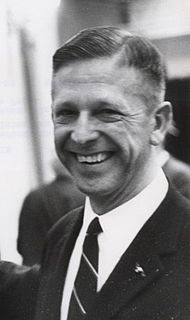Willem the Toom
Willem den Toom (born July 11, 1911 in Rotterdam , † December 13, 1998 in Amersfoort ) was a lieutenant general of the Dutch Air Force and politician of the People's Party for Vrijheid en Democratie (VVD).
Life
Officer training and World War II
After attending the Rijks Hogere Burgerschool in Den Helder , Toom joined the armed forces in 1930 and completed his training as an officer at the Royal Military Academy ( Koninklijke Militaire Academie ) in Breda by 1933, where he was promoted to lieutenant in the infantry on August 1, 1933 took place. He then stayed at the military academy and later took part in a one-year observation course in Soesterberg between 1936 and 1937 .
After completing the course, he was promoted to first lieutenant of the infantry on July 1, 1937 and worked in Department 2 B of the Ministry of Defense until 1939. Then he was in command of the observation school at the Bergen military airfield until 1940 and, after obtaining his pilot's license, he was also an air force officer in the War Ministry. After the occupation of the Netherlands by the German Wehrmacht , he became a prisoner of war and was then housed in internment camps in Germany until the end of the war in 1945 .
Post-war period and promotion to colonel
After the war he was employed from 1945 to June 1946 as a trainer and liaison officer in the navigation school in Jurby on the Isle of Man . After his promotion to captain , he was a personnel officer in the Directorate of the Air Force in Scheveningen between June 1946 and April 1949 and completed a one-year course at the War College ( Hogere Krijgsschool ) in The Hague from 1948 to 1949 .
During this time, Toom was promoted to major on November 1, 1948 , and became an aviation advisor in the Minister of War's military cabinet in April 1949. After his promotion to lieutenant colonel , he was appointed head of the section for operations in the air force staff in 1950 and then, in May 1952, head of the air force section at the European Defense Community in Paris . On October 1, 1953, he was promoted to colonel and at the same time took over the post of sub-chief in the staff of the air force in Scheveningen until November 1955, before he was then commander of the air force base in Ypenburg from November 1955 to March 1956 .
Promotion to lieutenant general, state secretary and minister

After his promotion to commodore on March 1, 1956, Toom became commander of the Air Force Training Command in Arnhem and then between September 1958 and October 1960 both head of the Dutch military mission at the Supreme Headquarters Allied Powers Europe (SHAPE) and military advisor to the Permanent Representative of the Netherlands to the NATO .
On October 1, 1960, he was promoted to major general . As such, he was Deputy Chief of Air Force Staff from October 1960 to May 1963 and then Director of Air Force Materials until November 1963.
On November 25, 1963, Toom, who has meanwhile become a member of the VVD, was appointed State Secretary in the Ministry of Defense with special responsibility for matters relating to the air force and carried out this task in the government of Prime Minister Victor Marijnen until April 14, 1965.
On April 20, 1965, Toom was made a Knight of the Order of the Dutch Lion .
After he was promoted to Lieutenant General on June 1, 1965, he also became Chairman of the Policy Board of the NATO Air Defense Ground Environment (NADGE) and remained in this position until April 5, 1967.
On April 5, 1967, the Toom was appointed Minister of Defense by Prime Minister Piet de Jong in his cabinet , and was a member of this until the end of de Jong's term on July 6, 1971. As defense minister, he began planning for the acquisition of nuclear submarines on the one hand, but put the purchase of Leopard 1 - battle tanks through. On the other hand, the decommissioning of the aircraft carrier Karel Doorman fell into his tenure in October 1968.
After leaving the cabinet, he was appointed commander of the Order of Orange-Nassau on July 17, 1971 because of his services to Dutch defense policy .
Web links
- Biography in Parlement & Politiek
- Netherlands Ministries (rulers.org)
| personal data | |
|---|---|
| SURNAME | Toom, Willem den |
| BRIEF DESCRIPTION | Dutch lieutenant general and politician (VVD) |
| DATE OF BIRTH | July 11, 1911 |
| PLACE OF BIRTH | Rotterdam |
| DATE OF DEATH | December 13, 1998 |
| Place of death | Amersfoort , Utrecht Province |
